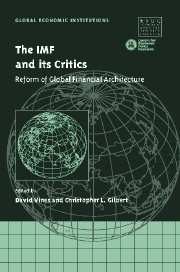Book contents
- Frontmatter
- Contents
- List of figures
- List of tables
- List of contributors
- Acknowledgements
- Introduction
- 1 The IMF and international financial architecture: solvency and liquidity
- 2 Progress towards greater international financial stability
- 3 International coordination of macroeconomic policies: still alive in the new millennium?
- 4 The Report of the International Financial Institution Advisory Commission: comments on the critics
- 5 Reforming the global financial architecture: just tinkering around the edges?
- 6 The IMF and capital account liberalisation
- 7 How should the IMF view capital controls?
- 8 The resolution of international financial crises: an alternative framework
- 9 Whose programme is it? Policy ownership and conditional lending
- 10 The IMF and East Asia: a changing regional financial architecture
- 11 The role of the IMF in developing countries
- 12 Argentina and the Fund: anatomy of a policy failure
- 13 Countries in payments' difficulties: what can the IMF do?
- 14 Accountability, governance and the reform of the IMF
- 15 The IMF at the start of the twenty-first century: what has been learned? On which values can we establish a humanised globalisation?
- Index
- References
9 - Whose programme is it? Policy ownership and conditional lending
Published online by Cambridge University Press: 04 December 2009
- Frontmatter
- Contents
- List of figures
- List of tables
- List of contributors
- Acknowledgements
- Introduction
- 1 The IMF and international financial architecture: solvency and liquidity
- 2 Progress towards greater international financial stability
- 3 International coordination of macroeconomic policies: still alive in the new millennium?
- 4 The Report of the International Financial Institution Advisory Commission: comments on the critics
- 5 Reforming the global financial architecture: just tinkering around the edges?
- 6 The IMF and capital account liberalisation
- 7 How should the IMF view capital controls?
- 8 The resolution of international financial crises: an alternative framework
- 9 Whose programme is it? Policy ownership and conditional lending
- 10 The IMF and East Asia: a changing regional financial architecture
- 11 The role of the IMF in developing countries
- 12 Argentina and the Fund: anatomy of a policy failure
- 13 Countries in payments' difficulties: what can the IMF do?
- 14 Accountability, governance and the reform of the IMF
- 15 The IMF at the start of the twenty-first century: what has been learned? On which values can we establish a humanised globalisation?
- Index
- References
Summary
Introduction
IMF lending to countries is generally conditional on the government and Central Bank carrying out specified policies and achieving specified outcomes. Some of these conditions might be prerequisites for an initial disbursement, while others will be requirements for subsequent drawings on a standby arrangement. In discussions of the appropriate conditions, IMF and country officials often disagree, sometimes diametrically. Economic programmes supported by IMF resources usually are negotiated compromises between the policies initially favoured by the Fund and those favoured by the country's authorities. In some cases, having gone through this process of negotiation, the authorities might be reasonably happy with the outcome and may be said to ‘own’ the programme even though it was not their original preference. In other cases, they might be swallowing a bitter pill simply because it is the only way to get the IMF to cough up the money. This chapter tackles two questions raised by the distinction between ‘owned’ and ‘imposed’ outcomes. Is the distinction empirically meaningful? If so, what can be done to operationalise it?
First, it is necessary to define ‘policy ownership’. Several definitions have been offered in the literature, but it is not easy to devise a definition that is empirically relevant. For a government to own a set of policies does not require that officials think up the policies by themselves, nor that the policies be independent of conditionality.
- Type
- Chapter
- Information
- The IMF and its CriticsReform of Global Financial Architecture, pp. 225 - 253Publisher: Cambridge University PressPrint publication year: 2004
References
- 10
- Cited by



